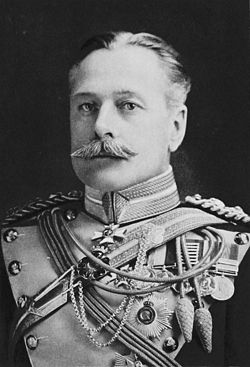Douglas Haig
| The Earl Haig | |
|---|---|

Field Marshal Lord Haig
|
|
| Nickname(s) | "Master of the Field" "the Butcher of the Somme" 'Butcher' Haig. |
| Born |
19 June 1861 Charlotte Square, Edinburgh |
| Died | 29 January 1928 (aged 66) 21 Prince's Gate, London |
| Allegiance |
|
| Service/branch |
|
| Years of service | 1884–1920 |
| Rank | Field Marshal |
| Battles/wars |
Mahdist War Second Boer War First World War |
| Awards | see below |
Field Marshal Douglas Haig, 1st Earl Haig, KT, GCB, OM, GCVO, KCIE, ADC (19 June 1861 – 29 January 1928) was a senior officer of the British Army. During the First World War he commanded the British Expeditionary Force (BEF) on the Western Front from late 1915 until the end of the war. He was commander during the Battle of the Somme, the battle with one of the highest casualties in British military history, the Third Battle of Ypres, and the Hundred Days Offensive, which led to the armistice of 11 November 1918.
Although he had gained a favourable reputation during the immediate post-war years, with his funeral becoming a day of national mourning, Haig has since the 1960s become an object of criticism for his leadership during the First World War. He was nicknamed "Butcher Haig" for the two million British casualties endured under his command. The Canadian War Museum comments, "His epic but costly offensives at the Somme (1916) and Passchendaele (1917) have become nearly synonymous with the carnage and futility of First World War battles."
...
Wikipedia
